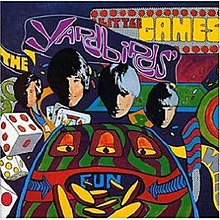Little Games
| Little Games | ||||
|---|---|---|---|---|
 |
||||
| Studio album by the Yardbirds | ||||
| Released | 10 July or 24 July 1967 | |||
| Recorded |
|
|||
| Studio | Olympic & De Lane Lea, London | |||
| Genre | ||||
| Length | 30:28 | |||
| Label | Epic (no. LN 24313/BN 26313) | |||
| Producer | Mickie Most | |||
| The Yardbirds' American chronology | ||||
|
||||
| Professional ratings | |
|---|---|
| Review scores | |
| Source | Rating |
| AllMusic – Little Games | |
| AllMusic – Little Games Sessions & More | |
| The New Rolling Stone Album Guide – Little Games | |
Little Games is the fourth American album by English rock band the Yardbirds. Recorded and released in 1967, it was their first album recorded after becoming a quartet with Jimmy Page as the sole guitarist and Chris Dreja switching to bass. It was also the only Yardbirds album produced by Mickie Most.
Although the new lineup was becoming more experimental with longer, improvised concert performances, the Yardbirds' record company brought in successful singles producer Most to coax out more commercial product. However, neither material that properly presented their new approach nor hit singles were forthcoming. Little Games became the Yardbirds' final studio album, although Most continued to produce singles for the group. These were later collected and released with the original album along with outtakes and alternate mixes on an expanded edition titled Little Games Sessions & More in 1992.
After the commercially and critically successful Yardbirds' albums Having a Rave Up with The Yardbirds (1965) and Yardbirds/Over Under Sideways Down aka Roger the Engineer (1966), founding member and bassist/musical director Paul Samwell-Smith left the group to pursue a career as a record producer. He was replaced on bass by studio guitarist Jimmy Page, whom the Yardbirds had originally approached to replace Eric Clapton. Page's position as bassist was temporary and within a short while he switched to second lead guitarist alongside Jeff Beck, with rhythm guitarist Chris Dreja taking over on bass. In 1966, the Beck/Page dual lead guitar line-up produced the psychedelic "Happenings Ten Years Time Ago", "Psycho Daisies" and "Stroll On", the updated remake of "The Train Kept A-Rollin'" for their appearance in Michelangelo Antonioni's film Blow-Up. However, by the end of 1966, Beck was fired from the band due to an illness that was preventing him from playing gigs while on tour in the US, and they continued as a quartet with Page as the sole guitarist.
...
Wikipedia
